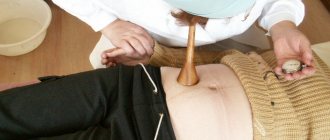Colic in newborns
These are periods of intense crying that exhaust parents. All attempts to calm a baby between 2 weeks and 5 months are futile. There is no clear connection between screams and feeding, wakefulness or other facts. Colic occurs spontaneously and also ends suddenly. Moms and dads make a lot of assumptions and try to identify cause-and-effect relationships. However, all this is speculation; the true causes of infant colic are not reliably known. You can read more about colic in our article: How to understand that a baby has colic?
Gas in newborns
This is a manifestation of flatulence. Excessive gas formation in the intestines usually leads to bloating and intense expulsion of air. And in this matter there is an understanding of the reasons, the mechanism of development and tactics of action. The reasons for increased gas formation most often lie in nutrition: either in the diet of a nursing mother, or in improper feeding of the baby himself.
How to help a newborn with gas leaks?
So, you have discovered gas in your baby. How to help your baby? Here are the most effective methods:
- Massage: after the baby starts crying, you should take him in your arms, pressing him to your tummy. After this, you need to put the baby on his back and gently rub his stomach with your palms. You should make gentle movements in a clockwise direction. It is important to distract the child from the procedure by talking to him. The massage should be very careful: do not put too much pressure on the baby’s stomach, as this may cause him pain;
- Fitball exercises. Gaziki in newborns will help eliminate the usual gymnastic fitball. The child should be placed on the ball with his tummy down and gently rock him up and down with gentle springy movements. This exercise should be done not at the time of an attack, but when the baby feels well;
- Warmer. A regular baby heating pad placed on the baby’s tummy will help relieve pain;
- Gas outlet pipe . A gas outlet tube allows you to quickly relieve the condition of a baby suffering from increased gas formation. All parents must have such a tube in their home;
- Enema . To relieve your baby of constipation, which often causes increased gas formation, you can use a regular enema. By the way, doctors advise doing an enema before performing a procedure using a gas outlet tube.
- Tiger on a branch. Place the baby on your hand so that his tummy is positioned on it like a “tiger on a branch”, while his head should be in your palm. This position helps push gases out of the intestines, which will quickly calm the baby down. This technique is best left to dad, who has strong and confident hands.
- Airplane . Without changing position, straighten the child’s arms, making an “airplane” motion, and rock the baby in different directions. This exercise is useful not only for digestion, but also for strengthening the back muscles. The child will receive great pleasure by combining business with pleasure.
- Warm baths . A bath with warm water helps to relax the abdominal muscles, and, therefore, will help get rid of accumulated colic in the intestines and gas in the child. You can add a pre-prepared chamomile decoction to the water, which will have an additional calming effect on the baby and relieve tension.
- Gymnastic exercises. Gymnastic exercises will help overcome gas in newborns, which are performed while lying on their back. To do this, you need to alternately bring the baby’s knees to the tummy, connecting the left knee to the right side and vice versa.
- Pose on your stomach. Babies really like to lie on their tummy, because in this position the emphasis is on the intestines, resulting in the free passage of gas. The baby will be doubly pleased if his mother puts him on her stomach, because this way he will see his mother’s face and feel much more comfortable.
It is necessary to look after the baby if he is lying on the crib in a position on his stomach, so that the newborn does not rest his head on the pillow and block his breathing. This applies to those children who still cannot hold their heads well.
If gas in newborns is observed too often, you should ask the doctor to prescribe special medications: pro- and prebiotics, carminatives, medications to improve digestion, etc. You should not self-medicate: sometimes gas in newborns indicates the presence of a serious illness.
Feeding mistakes that can lead to gas
- improper attachment to the breast (swallowing air)
- in one feeding, applying to both breasts (excessive supply of foremilk when hindmilk is not reached)
- wrong choice of mixture
- incorrectly calculated volume of one-time feeding or frequency (not corresponding to the age or actual weight of the child)
- improperly prepared mixture (measuring spoon not removed, too hot water)
- incorrectly selected nipple for the bottle (not according to age or with additional holes created
- failure to follow the bottle feeding technique (if you hold the bottle at an angle of less than 40°, air may be swallowed during feeding)
It is important!
If the baby is bottle-fed, then you should carefully choose the formula. Pay attention to Nutrilak Premium Comfort. The mixture is designed specifically for babies with sensitive digestion.
What are the signs and symptoms of baby gas?
If you do not have the time or opportunity to read the entire article, watch the video on this topic:
Belching
Burping is a natural way of expelling gas accumulated in the stomach, and parents should encourage the child to burp during and immediately after meals. However, if your baby hiccups and burps excessively, this may indicate that too much air is being swallowed during feeding.
Regurgitation
Spitting up is common in babies and can be normal. Most babies burp during or shortly after feeding, and this is often accompanied by burping in the baby.
Sometimes this can be due to the type of formula, ingredients in breast milk, feeding too much or too quickly.
Bloating
The gas is mobile and, when accumulated in the intestines, acts as a plug, causing the flow of gastric juices to slow down or stop. A bloated stomach may be a sign that gas is entering the intestines and accumulating, putting pressure on the intestinal walls.
The pressure created thus causes bloating in the abdomen, leading to pain and discomfort. A child's immature digestive system may be unable to cope effectively, and some children may experience painful cramping.
Flatulence
It is normal for babies to pass gas about 15 to 20 times a day. Air can enter the digestive system from several sources, including normal digestion of nutrients from milk or formula, as well as ingestion of air during feeding and crying.
However, excessive gas in newborns may indicate incomplete digestion of food due to very immature digestive processes.
Bad bacteria and viruses can also cause excessive gas, flatulence and even diarrhea. These infections may require medical attention.
Excessive moodiness
Crying is a baby's way of telling you something. Thus, crying occurs frequently and for many reasons, such as hunger, discomfort, loneliness, pain, fatigue or gas.
Parents tend to describe the cry when using gas as sharper and sharper, as if the child is in pain.
In fact, with intestinal gas, you may notice that the child’s face turns red, his fists are clenched, his knees are pulled up to his chest or tense, and the baby makes grunting sounds.
If your baby cries three or more hours a day and at least three times a week, he may have colic.
Anxiety or insomnia
Any form of discomfort will make it more difficult for the baby to fall asleep.
How to help your child cope with gases?
Help lies in eliminating the root causes. For short-term but quick relief of the baby's condition, tummy massage and posture therapy are best.
The large intestine is where gases accumulate. Therefore, light massage movements along the colon from the baby’s lower right corner (left for us) up, to the right and further down help move them to the place of natural exit. Laying on the stomach and using the disembarkation technique helps to facilitate bowel movements by changing the position of the baby's body.
When a newborn has gas, what should parents do?
Sometimes attacks of gas formation in a baby are inevitable. This condition of the child can cause concern among parents. But there are several methods that often help newborns from gas.
Massage
Many parents prefer this non-invasive and relaxing technique for getting rid of gas.
Massage can be applied approximately 30 minutes after feeding or when symptoms appear:
- Step 1: Place your baby on his back. You can start by moving your legs in a few circles, similar to how a baby rides a bicycle. This will help the baby release gases;
- Step 2: Massage your baby's belly.
Make gentle stroking circular movements in a clockwise direction. Your touch will help soothe the baby and move gas along the intestines. The intestines “work” clockwise, so this is the best direction for massaging movements. Don't press too hard. This should not cause pain to the child; - Step 3: Place baby face down, stomach on lap. Gently move your legs to massage your belly. This slight pressure will help move the gas. You can also gently pat the back.
Infant massage can relieve your baby's tummy troubles and it won't take much time.
Use of medications
There are three types of antigas medications, and each works differently:
- Simethicone .
Simethicone is a drug that is marketed as a gas reliever. The medicine binds the gas bubbles together, which, in theory, makes it easier for them to escape. Simethicone preparations typically contain synthetic ingredients such as artificial colors and flavors, as well as emulsifiers and fillers. Simethicone was not particularly effective in several studies; - homeopathic remedies . Homeopathic medicines contain natural active ingredients that provide safety for newborns and provide effective relief. Unlike simethicone, homeopathic remedies do not require constant dosing;
- probiotics. New research suggests that supplementing with an infant probiotic will alleviate some infant gastrointestinal problems when given over a period of several weeks.
If your baby is introduced to complementary foods, give him some yogurt. It will fill your baby's intestines with various strains of beneficial intestinal bacteria.









